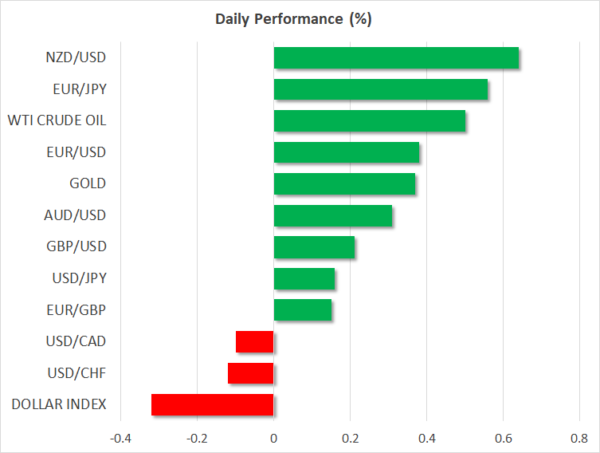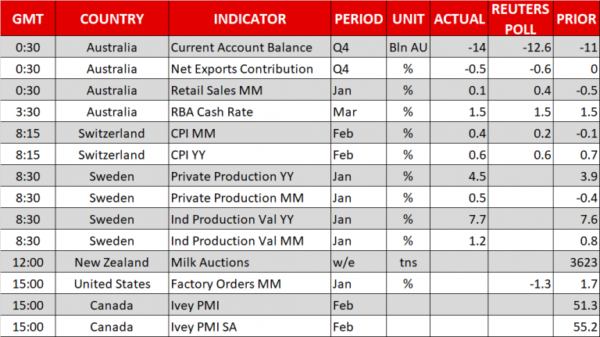Here are the latest developments in global markets:
FOREX: Dollar/yen rallied significantly towards 106.34 (+0.13%) during early European afternoon, reversing earlier losses on news that North Korea was willing to begin negotiations with the US and abandon its nuclear program if regime’s safety is guaranteed according to South Korean officials. Sources also stated that the South and North Korean leaders will meet for a summit at the end of April along the border. The dollar index, though, dived to 89.72 (-0.45%) as other major currencies strengthened as well. Euro/dollar surged to 1.2396 (+0.59%) despite the EU’s threats to impose tariffs on US products in response to Trump’s trade protection measures announced on Friday. Investors, though, were less worried about a trade war after calls by US officials to reconsider the import restrictions. Political uncertainties in Italy were also somewhat offset by Germany’s successful efforts to reach a grand coalition agreement, providing some support to the common currency. Pound/dollar rallied to 1.3903 (+0.40%) ignoring comments by the French Finance Minister who said today that financial services “cannot be in a free trade agreement after Brexit”. Aussie/dollar and Kiwi/dollar spiked higher to 0.7818 (+0.70%) and 0.7286 (+0.89%) respectively, while dollar/loonie tumbled to 1.2926 (-0.25%).
STOCKS: European stocks gained positive momentum on Tuesday as the focus turned back to the corporate news. The pan-European STOXX 600 and the blue-chip Euro STOXX 50 were up by 0.77% and 0.60% respectively at 1100 GMT with telecommunications and utilities driving the markets. The German DAX 30 climbed by 1.11% as auto stocks rebounded, the French CAC 40 jumped by 0.40%, while the Italian FTSE MIB was the biggest winner, surging by 1.43%, above six-month lows hit yesterday. This came after news that activist investor Elliott Management is building a stake in Italian telecom operator Telecom Italia to counter how its largest investor Vivendi SA runs the company. The UK’s FTSE 100 rose by 0.95%. US stock futures were in the green.
COMMODITIES: Oil prices retained earlier gains, with WTI crude and Brent last trading at $62.86 (+0.46%) and $65.73 (+0.29%) per barrel respectively. Yesterday the International Energy Agency revised its growth prospects on global oil demand upwards but warned that OPEC’S market share could weaken in the face of rising production in the US. In precious metals, gold was recovering yesterday’s losses, last seen at 1325.22 (+0.41%).
 Day ahead: Trump’s trade strategy under speculation; Australia’s Q4 GDP growth pending in the Asian session
Day ahead: Trump’s trade strategy under speculation; Australia’s Q4 GDP growth pending in the Asian session
Looking forward to the day, there will be few economic releases to drive the markets, while trade headlines will continue to attract interest although concerns of a potential trade war have somewhat eased today.
At 1500 GMT, the US will report readings on factory orders for the month of January, with analysts anticipating the number of purchase orders placed by manufacturers to decline for the first time in five months, falling by 1.3% on a monthly basis. This compares with a growth of 1.7% seen in December. At the same time, Canada will deliver February’s Ivey PMI which fell to the lowest level since June in January.
Milk auctions will be in focus in New Zealand as dairy products dominate the country’s exports. The release, though, is tentative, lacking a specific time, but most economic calendars have it marked for 1200 GMT.
Elsewhere, the EU will present its draft guidelines for a post-Brexit trade deal on Wednesday. However, the document is expected to be short of details since discussions on the issue have not developed substantially yet, probably forcing the UK Prime Minister to form her position on the trade front.
In energy markets, investors will be waiting for the API weekly oil report due at 2130 GMT.
Turning to today’s public appearances, the New York Fed President William Dudley (permanent voter) will be speaking at 1230 GMT ahead of the Bank of England’s chief economist and MPC member Andy Haldane, who will deliver remarks at 1800 GMT. The policymakers are not expected to comment on monetary policy directly but any reference to the topic is always a possibility from these highly-influential policymakers. Later in the day, the Governor of the Reserve Bank of Australia, Philip Lowe, will give a speech at the AFR Business Survey in Sydney at 2135 GMT, a few hours before Australia Statistics report GDP growth figures for the final quarter of 2017 early on Wednesday (0030 GMT).
Trump’s potential protectionism measures regarding aluminum and steel imports announced on Friday will continue to keep traders cautious but probably to a less extent following calls by the House Speaker Ryan Paul to reconsider the matter, while the House economic adviser Gary Cohn advised US companies dependent on the metal to meet the US President this week in an effort to prevent the order. However, the EU has already started preparing its position in response to Trump’s tariffs. According to Bloomberg news, the EU plans to impose bans on US brand imports including Harley Davidson motorcycles, jeans, and whiskey as well as agricultural and steel products.

